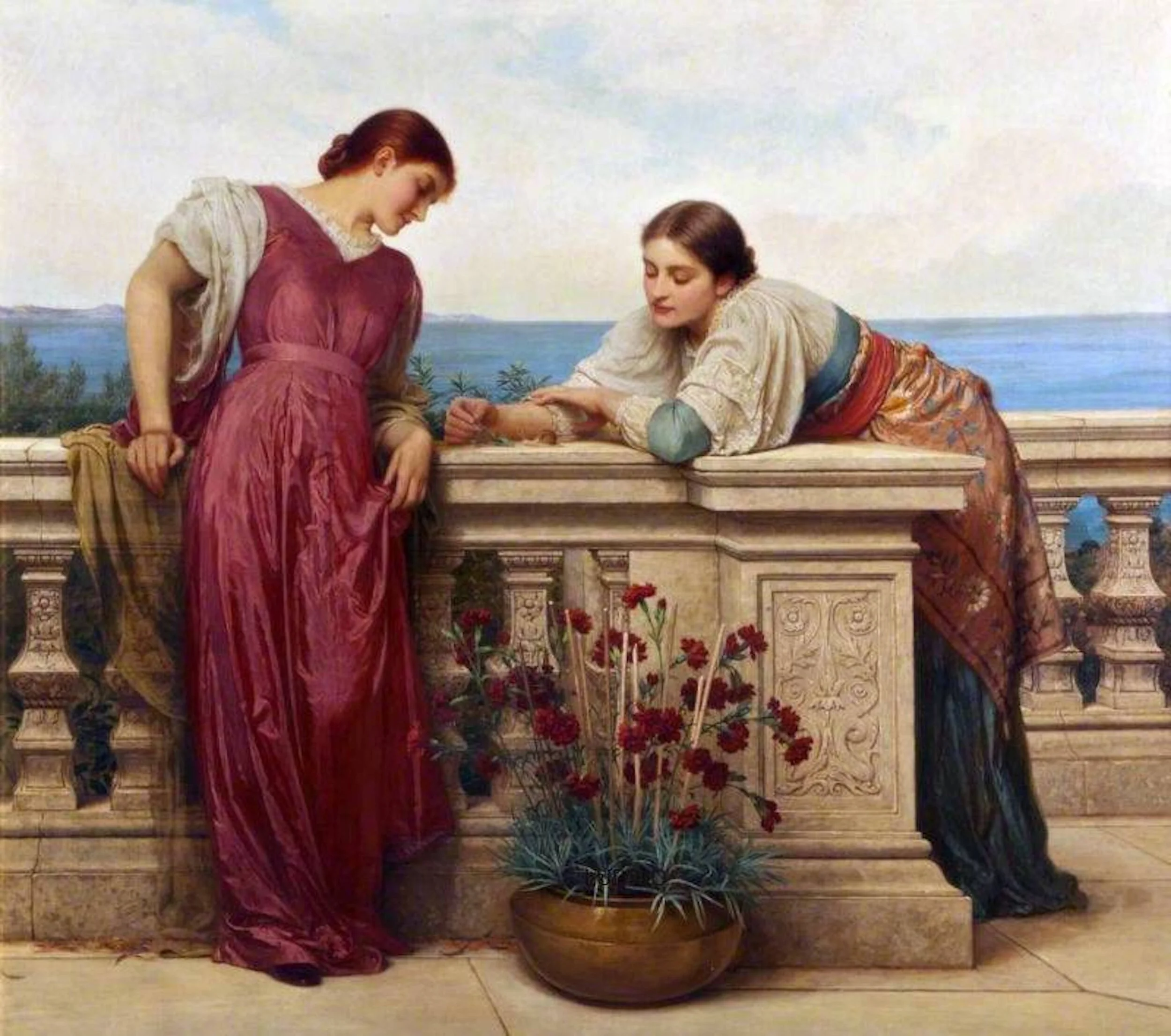'My idea of good company, Mr Elliot, is the company of clever, well-informed people, who have a great deal of conversation; that is what I call good company.'
'You are mistaken,' said he gently, 'that is not good company; that is the best.'
- Jane Austen, Persuasion

A great balm for the tired soul is a comfortable conversation with friends. This good gift brings laughter and mirth, consolation and compassion. A familiar topic tested and explored around a table set with food and drink reminds one of the dinner table at home growing up. One thought leads down a rabbit trail that might end miles from where it began, but there’s sure to be outrageous, hilarious, and perhaps one or two brilliant insights along the way. Join us in our discussions though be warned: they may turn out to be a wild goose chase more often than a pursuit for the great white Stag.
Recent
Dr. Phillips graduated from Hillsdale College with a double major in Latin and Greek, and then went on to earn a PhD from the University of California Santa Barbara in Classical Studies. Currently, she teaches Latin and Greek for the House of Humane Letters. In this episode, she joins Katie to discuss the place of language in education, what Dorothy Sayers meant when she presented her famous essay “The Lost Tools of Learning” at Oxford, and the way her ideas have been misunderstood and misused in our time by neoclassical schools and institutions. Dr. Phillips explains in detail why education must always connect the universal principles to particular individuals and can never become a cookie cutter system designed to produce the same output with each child. Please listen, enjoy, and let us know your thoughts!
Angela Weiss, experienced Charlotte Mason homeschooling mom, pastor's wife, life long learner, and burgeoning scholar, joins us on this episode of our special series on education to talk about how wisdom, virtue, and knowledge intersect and work upon us. She and Katie specifically discuss Charlotte Mason's essay on The Great Recognition, as depicted by the 14th century fresco titled The Triumph of Saint Thomas Aquinas and the Allegory of Christian Learning. It covers the left wall of the Spanish Chapel connected to the Santa Maria Novella in Florence, Italy and was referred to as the Vaulted Book by John Ruskin. Angela and Katie discuss at great length the immense comfort that comes from remembering that the Lord is the source of all wisdom, so that our children's education depends not upon how much we ourselves know, but on the Holy Spirit guiding and working upon our children as they touch great minds through living books. We hope you'll join us for a fun and wonderfully comforting conversation about the source and nature of true education!
On this episode of our special series on education, Emily and Katie explore more deeply true education and what Charlotte Mason did for us by working so diligently to preserve the Western tradition of thinking and learning. They discuss the difference between the "why" and the "how" of educating, the importance of synthesis over analysis, and how the child must receive and digest knowledge herself instead of being force fed pieces of information. They dive into a lot more in this episode so don't miss it!
On this episode, Katie and Emily dive into a new series on education. Katie tells the story of her journey through the various worlds of education (Hillsdale, Liberal Arts, Classical Education, etc) and finally begins a brief description of the answers she has just started to find in Charlotte Mason, David Hicks, Karen Glass, Angelina Stanford, Cindy Rollins, and others. This is just the introduction...
In this episode, Katie is joined by Pastor David Kind from University Lutheran Chapel in Minneapolis, MN. They discuss the history of the liturgy from ancient times to today. They cover topics like how certain familiar ceremonial practices developed, why different churches practice the liturgy differently (or not at all), best practices for introducing a congregation to a new (to them) liturgical practice, and - one of Katie's favorite topics - the lectionary. Pastor Kind explains why the new three year lectionary was adopted by many churches and whether that was a good thing or not for the church as a whole. Listen and enjoy!
Emily and Katie discuss the transformational nature of motherhood. It is a new identity given to each woman. It is not easy, but neither is it a burden. The discussion comes to focus on the increasingly negative view of motherhood in America as a tremendous burden and miserable "career"; as a "gauntlet", a torture, and a daunting task. Emily remembers her own similar feelings when early on in motherhood and Katie describes the transformation she experienced when she became a mother and the true nature of motherhood that modernity has all but squashed in women. Enjoy!
With the start of Advent, Emily and Katie discuss all sorts of fun and meaningful aspects of the Advent, Christmas, and even Epiphany seasons. They also talk about listening to Handel's Messiah during these seasons and give some details and information about that work as well as a few guides to increase your enjoyment when listening to it. Enjoy!
In his famous essay by the same name, Wendell Berry asks the important question “What are people for?” A similar question could be asked about women. And the answer is connected. He makes the point that people are to be degraded and dehumanized in our current culture. Something similar has happened to women. They’ve been removed completely from their proper context and put into boxes - one side says they belong in a career, they ought to look just like men. The other side says they belong in the home and what they do there is limited. The idea that women are human beings has failed to occur to many.
October is Pregnancy and Infant Loss Awareness Month. The 15th of October is the annual day of observance for this type of tragic loss. Emily and Kate decided to dedicate an episode to discussing their own losses and how God grants us the strength and endurance to grieve for our little ones. They also discuss how Scripture gives us the words for expressing our deep sadness and helps all of us comfort one another.
A new season, a new cohost! Meet Emily Olson, wife, mother, writer, teacher, friend, and fellow Christian.
Katie and Shannon continue their discussion about education. They work through some practical questions like how to use a curriculum and what it might look like to "master" a subject before moving on to deeper philosophical questions like what the purpose of education ought to be, what a teacher is, and what the relationship between home and school should be. Enjoy!
In this episode, Katie and Shannon begin a discussion about the nebulous topic "classical education." After attempting to distill a description of modern classical education, they move on to discuss their own educational background from learning at home from their parents, to their formal education at the elementary, secondary, and college level. They dive into their personal stories of how each of them came to develop a sense of what education ought to be while recognizing that they have so much more to learn. Enjoy!
In this episode Katie and Shannon discuss how to face those times of inevitable discontentment in life. They each have their own experience to draw upon as well as a lot of great advice that they have accumulated from others over the years. They explore how the Scriptures address discontent and talk about both how to address discontent with prayer and patience and some practical things that can help break the melancholy and refocus the mind away from oneself during such times. Enjoy!
In this episode Katie and Shannon discuss the difficult question of how to love one's enemies. They dive into distinctions and definitions about friends and enemies and try to make some sense of Jesus's command. Meanwhile, Shannon's little son, John, joins them briefly and they discuss a few commonplace quotes, too. Enjoy!
In this episode, Shannon and Katie discuss the nature of the disunity that is so prevalent in our nation's society today. They talk about the possible results of that disunity and the plausibility of reunification efforts. They also discuss what each has been reading and learning about lately and share a few commonplace quotes. Enjoy!
Jumping right into a conversation about how men can support women in childbirth, Shannon and Katie attempt to discuss how some of their ideas might be put into practice, wrapping up their discussion about true community…
Shannon and Katie continue their conversation about community. After a slight digression down a theological path, they dive into a question of what must be at the center of true community. They also touch on the purpose of community and how community can be sustained even in the midst of disagreements. Enjoy!
Shannon and Katie begin a discussion about community. They examine the great interest that “community” as an idea has gathered in the last seventy or so years and what has sparked that interest. They discuss what makes a community, looking especially at the idea that a group of people must hold beliefs “in common” in order to maintain community. They touch briefly on the connection that agriculture and landownership have with community, and hope to continue the discussion soon! Enjoy.
“And I have an admiration for the people that I work with, because I know it was hard for them to get therapy, to overcome their sense of embarrassment, as if there’s something wrong with having a mental illness. And yet they come in and they gift me with their presence and they gift me with their stories and they gift me with the chance to try to help them.”
Click to listen to our first recorded conversation. We discussed how we developed the idea for Penelope’s Loom, where the name comes from, and then we jumped right into a conversation about Woman’s Craft, feminism, and what we think of when we hear the term womanhood.

















Katie is joined in this episode by three lovely ladies who all homeschool their children following the educational philosophy depicted by Charlotte Mason and embodied by the Ambleside Online curriculum. They share a wealth of wisdom, experience, reassurance, and an introduction to what this life of learning looks like. This conversation encompasses even more than homeschooling ideas, though. They dive into what education really is and they touch on many of the foundational ideas and principles of a true life of learning. Enjoy!